#holiday recommendations
Text
Window Shopping | Tessa Bailey

I've read a lot of Tessa Bailey books and they've all been so fun! I will say..also bonkers. This is a recently felon gets out of prison, comes upon a window display, does a great job making said window display, and gets hired by the company, then falls for the CEO. Silly but a quick, fun, romance.
Format: e-book
Read in: 2023
0 notes
Text
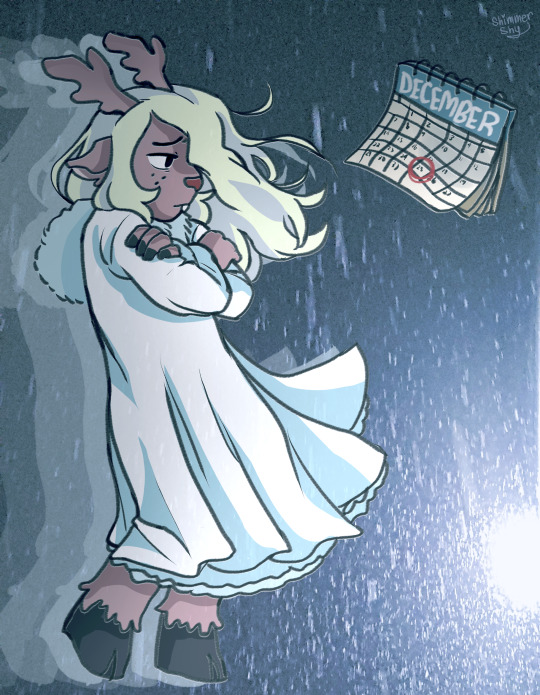
Thinking about her….
#The background image is a photo I took! From the first snow of the season for me on Nov. 25th :) it was very beautiful#Also i was listening to a playlist with old christmas songs and a crackling fireplace in the background while I drew this.#It was very nice. 10/10 do recommend#my art#deltarune#noelle#noelle holiday#safeutdr
1K notes
·
View notes
Text
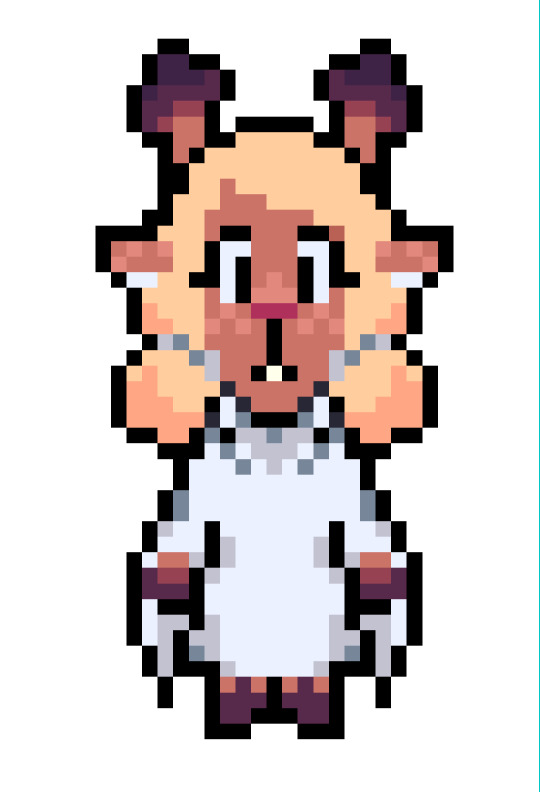

Finished Noelle's redesigned sprites!!
Feel free to use them if you want to! (with credit ofc)
#deltarune#mint art#noelle ever#deltarune characters#noelle deltarune#noelle holiday#sprite edit#sprite#deltarune redesign#ty kitzels for recommending pixel studio !! much appreciated#i tried to give noelle curly hair but its hard in pixel art xd
848 notes
·
View notes
Text
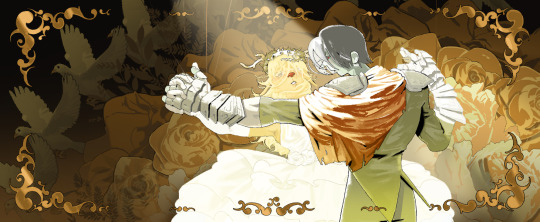
#deltarune#kris deltarune#noelle holiday#snowgrave#I've been having soo many thoughts about deltarune snowgrave route and the way it frames the relationship between Kris and Noelle#won't go on a tag rant but i really recommend checking out hellspawnmotels deltarune stuff the way they talk about this is reallyinterestin#g
242 notes
·
View notes
Text
Its #BatAppreciationDay so please appreciate this awesome 19th century Japanese kosode decorated with embroidered lucky bats, photographed in 2019 at The Life of Animals in Japanese Art exhibition at the National Gallery of Art in DC:

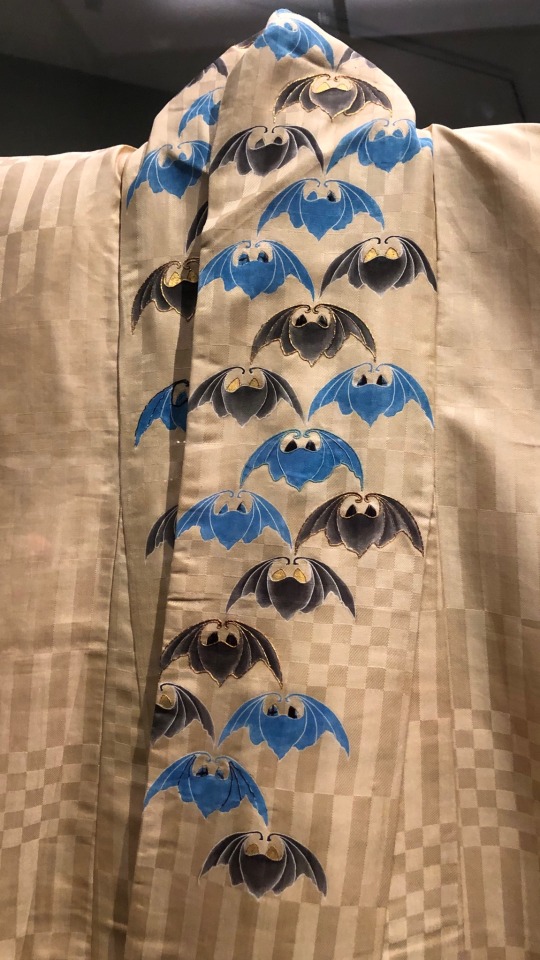


Kosode with Bats
Japan, Edo - Meiji periods, 19th century
silk twill, paste-resist dyed, embroidery, 67⅜ × 48⅞ in.
National Museum of Japanese History, Chiba Prefecture
“In the West, bats - nocturnal in habit and denizens of dark places tend to be viewed as unlucky, but in China they have long been considered an auspicious motif (one of the characters used to write the word "bat" is a homonym for good fortune). The Kabuki actor Ichikawa Danjüro VII (1791-1859) used bat motifs in his costumes, and the perception of these animals as a chic design element spread rapidly throughout Japan in the nineteenth century. Here a great number of them are arranged in right-left symmetry from the base of the collar to the hem.”
The above info is from the official exhibition catalog - this bat kosode is on p. 124:
The Life of Animals in Japanese Art (2019)

#bat#bats#bats in art#animal holiday#Bat Appreciation Day#International Bat Appreciation Day#The Life of Animals in Japanese Art#exhibition#museum visit#National Gallery of Art DC#book recommendation#Amazon Associates#kosode#historical costume#Japanese costume#Kabuki#Japanese art#East Asian art#Asian art#19th century art#garment#embroidery#auspicious symbol#animal iconography#animals in art
775 notes
·
View notes
Text

From where I'm from, Ashura is kids favorite holiday: brand new Eid clothes, various candy and snacks but especially, new toys.
That's the first thing that popped up when looking up @davekatweek today's theme, and I'm a firm believer in drawing Karkat the crabby troll smiling. 🦀
#davekatweek#davekatweek2024#homestuck#artists on tumblr#my art#sketch#dave strider#drawing#oc#davekat#karkat vantas#ashura#<- wow this didn't pop up in recommended tags#day 4#seasons#holiday
32 notes
·
View notes
Text
Foolish taking the time to consider the power in his hands, thinking over what the consequences will be and who he’s going to accuse. Remembering what Cellbit had said to him in Purgatory - we are not fish - and believing he understood what that implies. Talking briefly with Bad, who’s willing to take the fall. Leaving it up to chaos, returning to the room in Cellbit’s castle and flipping a coin. Saying it wouldn’t have mattered if he had used a coin or marbles or any other method, “destiny arrives all the same.” The coin landing face up, cementing Cellbit’s fate.
The Ordem Paranormal: Calamidade music in the background as he looks at the coin and deliberates: Escolha Errada - Wrong Choice.
#every family needs a bit of drama around the holidays ammirite?#today was fucking crazy for foolish lore I cannot recommend watching the vod if you didn’t catch it#because holy shit man. holy shit. the talk with bad. the monologuing in his office. the chaos room and coin flip. the musiccccccccc#I suppose we’ll see if this is the right move - or if the song choice will really come back around as tragic foreshadowing#the ‘we are all fish’ bit. I’m hoping Cellbit is truly understanding it. that he’s planned on getting caught because he’s certainly been#announcing himself and his kills. but like. we’ll see#mcyt#qsmp#q!foolish#q!cellbit#z speaks
119 notes
·
View notes
Text
Bonus 3
I so frequently have to start these intros with “where were we?”, because I so frequently confuse even myself with regard to where any given in-progress story left off... typically it’s a cliffhanger of some sort, but off of, or onto, which specific cliff were we hanging? Well. Here in this continuation of a Christmas tale, we—or rather, Myka and Helena—were suspended in a broken-down elevator in an accounting firm’s office building in Cleveland. Something might’ve been juuuuust about to happen (see part 2 for what that something probably was, and part 1 for the causal chain that got them there), but a voice interrupted, seemingly from on high.
Bonus 3
“Is everybody okay in there?” the voice from heavenward repeats.
Myka looks up, this time confronting not her own reflection but a dark emptiness, one that is partially filled by... a firefighter?
She is sorely tempted, in the moment, to proclaim that everybody in here is most certainly not okay, given that she herself is among that “everybody” and is ready to spit nails at the timing of this supposed rescue... she talks herself down, though, because the firefighter certain doesn’t need to be informed about the grinding frustration of unrealized near-certainty.
The firefighter, most likely concerned about the lack of response, goes on, “If you’re in distress, we can hoist you up through here, get you faster help. If you’re okay, you can wait till we let the car down to the next level and get the doors open. Then you’ll be able to walk out.”
Myka looks at Helena, and they are on the same page regarding being hoisted. “Walk,” they both say.
“Good choice,” the firefighter tells them. “Easier on everybody. Never know when you’ll run into injuries, though... or sometimes worse, claustrophobics, so we gotta check.”
“Among our many problems, claustrophobia is not,” Helena says. She smiles up at the firefighter.
Who smiles back. She’s good-looking, this firefighter.
Not jealousy, Myka admonishes herself. Not now.
“Good for you,” the firefighter tells Helena. Maybe a little jealousy. Then: “I’ll put the lid back on; you two sit tight.”
She disappears; the mirror reappears. Magic-esque.
“Well, this is overdetermined,” Myka mutters.
With a head-cock, Helena says, “I believe I know what that word means, but I’m not certain I know what it means. In context.”
Is she serious? Might as well assume so... “It’s kind of like if you actually had remarked on naughtiness,” Myka says. “But maybe all I really mean, in context, is ‘story of my life.’”
Now a squint. “I know what those words mean as well, but again I must ask—”
“Never mind. I had this wild hope that maybe one thing might go right. But here we are.”
“Being rescued doesn’t fall into the ‘go right’ category?” Helena asks. And now she blinks ostentatiously, combining innocence with a sparkle of eye.
You’ve been teasing me, Myka now suspects, and she wants to say it—to accuse it!—but the interruption stole her boldness. Instead she sighs out “of course it does” and resigns herself to contemplating the complications that have, over the span of time during which she and Helena have been hamhandedly dealing with their destiny, sat themselves down solid-awkward between possibility and realization.
And anyway, if Helena is teasing, does that mean she fails to feel the same urgency Myka does about what might, in the absence of intervention, have been... realized?
Myka has made so many miscalculations with regard to what Helena does, might, could feel. Could the tease, if that’s what it is, have a different significance? Maybe. But Myka is tired. Of miscalculating, yes, but also of hoping. Of wishing. Of hanging on a knife-edge of believing in something that fate keeps deciding should not happen...
Okay, deep breath. Maybe it isn’t fate this time. Maybe in this case it’s nothing more—or less?—than a disapproving elevator.
As they at last exit those hypercritical confines, Myka leans into that latter interpretation, saying back in the car’s direction, “You were pretending to be Jesus-birth-focused, whereas I think in actual fact you’re harking your way around the Old Testament, but as said testament gets cherry-picked by fundamentalist New-Testamenters who don’t know Hebrew. So congratulations on your historically insupportable theology.” She’s pretty sure the unnecessarily extended creak she hears from the mechanism is its version of a crude gesture.
Their firefighter, who had been the one to pry the doors open inch by inch and set them free, now says to Helena, “Did she maybe hit her head when the car stopped?”
“No, she’s merely imaginative,” Helena rejoins, cheerily.
“I’m imaginative?” Myka demands. “Says the father of something.”
The firefighter touches Myka’s arm as if it’s the next step toward physically restraining her, a clear indication of how unhinged her last statements must have sounded. Further indication: the firefighter says, “The whole elevator system’s shut down till they figure out what happened. Can you get down a lot of stairs okay, or do you need assistance?”
“Oh, I definitely need assistance, but not with stairs,” Myka tells her.
Helena steps smooth between the firefighter and Myka, taking Myka’s arm herself instead. “She’ll be fine, I believe. But thank you.”
She’s very gracious. The firefighter is very attractive. Did Helena move to break the firefighter’s hold on Myka... or to place herself closer to the firefighter?
Not jealousy, Myka reminds herself. Not now.
Particularly not now that they’re embarking on a stair-descent and leaving the firefighter behind, one step at a time. It’s an endless-seeming series—“a lot of stairs” indeed—on which they expend no small amount of time. And no small amount of energy.
As they near what seems, blessedly, to be the end, Myka huffs out, “If I ever start thinking I want to live in a high-rise, just say ‘elevator dealy-thingy’ to me to make sure I understand how much I’ll end up regretting it if there’s ever an emergency.” It’s the kind of thing she would say to Pete, so she backtracks: “Sorry. Never mind that. I’m tired.”
Helena’s breathing isn’t exactly unlabored as she says, “No, no. Object lessons. I might take one as well: feign injury so firefighters will convey us via stretcher down accursed emergency stairs.”
“Brilliant idea,” Myka says, though she does spare a “glad we didn’t put you through that” thought for their firefighter.
“Thank you. Coming from, as quite recently noted, such an imaginative individual, that’s a great compliment.”
“Sorry for that outburst too. I was just so ticked at the elevator for how it clearly intended to put a stop to—”
Fortunately/unfortunately, Myka doesn’t manage to finish the utterance, because fortunately/unfortunately, they’re at last pushing through the first-floor fire door.
In a perverse twist, which Myka suspects the elevator of somehow contriving, that door releases them into the cubicle farm. Very near Bob’s location. Where he is now enthusiastically, rather than resentfully, stationed.
“Ladies!” he greets them. Did the elevator text him to lie in wait? “I finally got paid! I’m flush!”
Helena nods in satirical approval. “And we were rescued from the elevator at an overdetermined moment. Such good news all around.” The verbal irony chokes Myka, for it confirms—entirely—that Helena had indeed been teasing.
“Good thing I was here to light a fire under you,” Bob swaggers, clearly oblivious to Helena’s sarcasm, and it’s for once a good thing that he’s paying most of his attention to Helena anyway, because Myka is utterly failing to keep her eyes from widening, her jaw from slackening, into the very dictionary illustration of incredulity. “So what are your plans, now that you’ve put the fear of god into Nancy and made her give me what I deserve?”
Fear of god... now Myka’s certain he and the elevator are in cahoots.
“We have business to attend to,” Helena tells him.
“IRS business?”
Helena smiles. It doesn’t reach her eyes. “Not at all,” she says, and Myka recognizes that tone as “continue at your peril.”
So of course Bob continues. “Oh, that kind of business,” he smarms, like the two of them are speaking in some super-secret, super-specific, only-we-know-what-the-word-“business”- means code. Infuriating in itself, but he goes on, “If you’re not on the clock, maybe you’d enjoy an evening out.” The “enjoy” is slimy, and the “maybe” is smug, as if he has no doubt the answer will be yes.
“Oh yes,” Helena says, bringing Myka up short, and “very much so,” she continues. What performance is this? “But not with you.” Myka exhales in relief. Helena then turns to her and says, “I believe you promised me an evening that would make up for our having been trapped?”
Myka nearly chokes again, now at the way “an evening” and “make up for” absolutely roil with salacious intent.
Bob yelps, “I knew it!” which Helena skewers with a completely, and completely transparently, fake-dense, “Knew what?”
He is sufficiently cowed to refrain from responding with anything involving the word “naughty.”
When they finally escape the building, Myka fumes, “Nancy Sullivan did not in any way go far enough with that guy. I don’t know what this pen would let me smite him with, but I’m extremely tempted to take it out of the bag and make a list of my own.”
“Despite the downside?” Helena asks. She’s dialed back the punish-the-offender spice; now she sounds her baseline undercurrent-of-amusement self.
Myka envies her ability to change registers so seemingly effortlessly. “I’m already off the charts, judgment-wise,” she admits, “so I honestly wonder how much downside I’d really feel.” It’s more than she would have been inclined to say, pre-elevator. But something has surely shifted.
“Hm,” Helena noises, a not-quite-poke of an answer. But she then asks, “Would I be on this list?”
Whiplash: back to an unassimilable suggestiveness. That’s better, though, than Helena making and conveying a guilt-ridden assumption, as she most likely would have done in the past, that Myka would pass judgment on her for her misdeeds.
“And if so, in which column?” Helena muses on.
Again Myka would love to have panache, to be able to play into the overdetermined idea of “naughty” or at least counter it with a clever turn on “nice.” Instead she offers something in hope, which she hopes is most immediately legible as practical and not too hopeful: “Since you implied I’m taking you out, I think I’d better do that. Or some other mechanism might decide to get all... judgy. Disapprovey? Obviously from a different theological perspective than the elevator, but even so.”
“Such other mechanism sounds strangely chivalrous. Holding you to account on my behalf? I confess I’m curious as to the form that chivalry might take.”
It’s a perfect opening to probe Helena’s true interpretation of the overdetermined interruption. “But the consequence of said chivalry,” Myka says. “I don’t want to risk it.”
“Any such consequence would be, at this point, merely delay,” Helena says.
Delay... the interruption was merely delay... which means Helena thought that not-quite realization of all their pent-up possibility was—thinks it is!—as inevitable as Myka had. As Myka does. Does now again. Okay, the tenses may be hard to render sensically, but Myka knows what it all means.
Alas, despite the change in their together-weather, she can’t quite see her way clear to realizing that inevitability on a sidewalk... to move in that direction, though, she undertakes to demonstrate that she can be the chivalrous actor, no disapproving mechanism required. Object lessons. “I know you haven’t had any food since this morning,” she says. “Are you hungry?”
Helena’s eyebrows rise. “Oh,” she says, as if only just remembering that her body has physical requirements. Could her time as a hologram have affected—dampened—her awareness of such necessities? Even thinking the question jabs Myka with want, to be the one to bring her back to the body. Its needs. “Yes, I am.”
“What do you like? What’s a favorite?” Please don’t let her say tacos from a truck, Myka begs the universe, because she would really rather not have to explain her lingering shivers around taco trucks as yet another dealy-thingy.
“Preferences are still in process.”
It isn’t “tacos from a truck,” so hallelujah. But it’s inscrutable. “Are they?”
“I’ve traveled through America and elsewhere, over the weeks I’ve been away.” Helena pauses, giving Myka time to appreciate this window, however minimal, onto an answer to the “where were you” question... sadly, “America and elsewhere” gives precious little insight into the reason for all this travel. Helena continues, “What I’ve found is that contemporary cuisine bears little resemblance to what I knew. Some is strange and off-putting; some is strange but surpassingly delicious. Have you experienced a ‘blooming onion’?”
Is that intended to occupy the former or the latter category? “Pete loves those,” Myka says. That should fit as a response to either one.
“They represent what I cannot help but imagine is a foretaste of paradise,” Helena says.
She sounds rapturous.
Thus Myka has a new goal: to inspire a tone in Helena’s voice even approximating the one with which she’s just expressed this unexpected adoration.
However, Myka also has a new frustration: that not one but two of the people who occupy essential positions in her life venerate blooming onions. Which she herself cannot stomach. How to process this? Maybe she could do it by simply watching Helena eat one of the vile things... that really might be worth doing, if only as a stick against which to measure Pete’s gusto...
Sadly, that’s not going to happen today, for a frantic search on her phone yields zero restaurants in the vicinity offering even an approximation.
Onions aside, however, the number of restaurants near to them is, in positive news, nonzero. Myka reads her list of results to Helena as suggestions, and she is genuinely entertained, as well as informed, by the vehemence with which Helena vetoes every option that isn’t aggressively carnivorous.
Twenty minutes later they’re seated at Marble Room, which billed itself on its website as featuring “Steaks and Raw Bar”: Helena had turned up her nose at “raw bar” but landed with claws on “steaks.”
Watching Helena leaf through a menu—sitting across from her at an intimate table for two and doing the same—is even more astonishingly normal than any of the other normal things Myka has seen Helena do, and has done together with her, today. “Have we ever been to a restaurant? Just you and me, being seated? Getting menus and looking at them?” She would of course remember it, if they had, but she asks so as to press on the newness of it.
Bonus: Her asking the question prompts Helena to propose they conduct an inventory, limited though they both know it is, of shared non-B&B meals. It seems a gentle tiptoe through the past, one that might help rather than hurt, so Myka agrees.
“We didn’t share any table in Tamalpais,” Helena begins.
“Too busy saving Claudia from combusting,” Myka concurs.
“And removing you, vertically, from the path of marauding vehicles,” Helena concurs back. She smiles at Myka with a spark, one that is neither naughty nor nice, but rather alchemizes both into a gift of energetic attention that should be impossible.
Oh, this... this is what Myka has found irresistible from the start, for the full alchemy is in fact not only Helena’s impossibly true spark, but how Myka herself responds to it: with an internal melt, the “oh, this” that always hits new, each time she feels it. They say the body doesn’t remember pain; apparently it also doesn’t remember, from one moment of recognition to the next, how it greets its perfect match.
Another of those irresistible moments—actually a cascade of them—had occurred on a plane, as they traveled to Pittsburgh to probe what had happened to the students in Egypt, about which Helena was of course hiding her full knowledge. Myka tries not to push too hard on how significant that episode had been to her, given all the internecine baggage, as she says, “Sitting on a 737 in row 32, me in E and you in F, choosing between the market snack box or the chicken-salad-sandwich plate... that doesn’t count, I’m pretty sure.”
“Alas, no. I did, however, appreciate your willingness to share your sandwich with me.”
“You said it was one of the worst things you’d ever tasted in your life.” In the sandwich-share’s wake, Helena’s face had presented an astonishingly unnuanced canvas of disgust, and Myka had despaired at having caused such a reaction, even as she had reveled in having taken the unprecedented opportunity to do so: “Want a bite?” she’d asked, desperately casual, and Helena had accepted the invitation, biting, all teeth and lips and... and then, sadly, the reaction.
“It was,” Helena says. “Nevertheless I appreciated your willingness—but aha!” she pounces, “sandwiches! We ate ful sandwiches together from that cart in Alexandria.”
“No seating there,” Myka reminds her. “Also no menus.”
“Disqualifying,” Helena concedes. She falls quiet.
They both know Egypt is the end; what follows is adversarial. And then incorporeal.
But today—this collaborative, embodied day—is a beginning. “So we should mark this as a first,” Myka says.
“Celebrate this as a first,” Helena responds... corrects? She looks down at her menu and doesn’t look up as she says, “Of many. If I may dare to hope.”
Myka waits to answer until the look-back-up has occurred. “Only if I may too,” she says, meeting and holding Helena’s eyes.
Which roll, those eyes, and Myka panics. “You may and I may, but such mutual hope will likely have no earthly effect,” Helena says, providing relief: the scoff was directed not at Myka, but at... everything.
Hoping to unscoff her back to celebrating, Myka tries, “Can’t we mutually hope for it to have that effect though? In addition to that underlying mutual hope, for this being the first of many?”
“We can,” Helena says, her brow skeptical, “but would that be sufficient? I suspect the overall situation is likely to require several recursive applications of hope.”
“I can’t dispute your suspicion,” Myka concedes. Is hope a finite resource? That feels like a philosophical dead-ender, or at the very least the beginning of a descent, so she tamps down her impulse to voice the question. They’re here now, a circumstance on which Myka certainly, and Helen probably too, would never have thought to expend any hope at all.
She gives her own look at the menu and, without thinking, blurts, “This meal’s going to cost me several recursive applications of my credit card.” Immediately she wants to swallow back those words; they’re yet another instance of something she’d say to Pete, and anyway mentioning money is so picayune, here in the midst of an historic first. And yet... it never ends well when she tries to pretend to sophistication, moneyed or otherwise, that she doesn’t have, so she gives up and goes all in. “I don’t even know what a ‘duroc pork chop’ is, much less why it would cost more than a coffee-table book. And my dad’s brain would break at the thought of adding a lobster tail to a meal. At the price of it too, but the very idea.”
“I can’t dispute your father’s position,” Helena says, and Myka loves the echo—loves that Helena bothered with the echo. “My mother would most likely respond the same. She was a servant, you know.”
Myka could assure her that she does know; she’s done enough research on the historical H.G. Wells to produce a double-doorstop of a family biography. But she is over-the-top eager to know what Helena might be willing to say, so she goes with what she hopes is an appropriate please-inform-me prompt, sugared with just enough eagerness: “Was she?”
Helena nods. “It trained her to be exceptionally practical, but she became even more so after the failure of my father’s shop compelled her to return to service. That was difficult for her—for all of us. Charles and I were both desperate to rise above that station... insofar as one could, we did a reasonable job of it, and what I’ve learned of Charles’s later life suggests he went even further. A century later, I have as well. So I’ll pay for the meal.”
“But disapprovey mechanisms!” Myka protests, realizing she’s piled error on error: first, she’s supposed to be taking Helena out; second, she’s implying that she can’t pay; and—
“For good or ill, money is no longer my limiting factor,” Helena says, halting Myka’s thought-careering.
She seems genuinely indifferent to the financial consequences, so Myka sets herself to try, against every fiber of her frugal and responsible being, to pretend like that’s okay. Besides, there’s another issue to pursue. “If not that... what is your limiting factor?”
“Ironically, time,” Helena responds instantly. Acerbically.
“That’s everyone’s,” Myka says, but just as instantly she understands it’s another utterance she should have censored, because she knows what the response will be.
“Unless one is bronzed.”
Expectation fulfilled. And yet: “You aren’t bronzed anymore,” Myka says. To emphasize that—or rather, to emphasize its implications—she extends her right hand across the table. Maybe Helena will take it... she is more hopeful about such a possibility than she has ever been.
“Or unless one is a hologram. Or, now that I think of it, unless one is a vampire.” Helena says this musingly, but she offers her left hand, and now they are touching, and Myka is regretting her vamp somewhat less. “Does that support your earlier postulate?”
Myka can muster few words with their fingers atangle. “Doesn’t matter,” she manages. “You aren’t those either.” So as to put all time-suspending states away, as the past or impossibilities. Or both.
“You are correct. I am none of those.” Helena’s grip on Myka’s hand tightens.
They are holding hands. And if it’s overly adolescent of Myka to find this barely precedented joining significant? So be it.
Together they sit, not letting go. Accustoming themselves, even, to skin on skin. Learning it.
A throat-clear invades Myka’s ears from some unclear direction; she raises her eyes to regard a server.
But those joined hands, hers and Helena’s, don’t immediately disengage. Helena doesn’t let go, and Myka doesn’t either. This has meaning, here among the bonuses: the waiter seeing is okay, and that okay-ness is a continuation. Nancy Sullivan saw. Bob saw—differently, but still. This server, different yet again, but even so: seeing.
“I’m Frank,” that server says. “Really pleased to be here for you tonight. First I need to explain not checking in earlier: you were in conversation, and we try not to let service intrude on your privacy. If that’s an error, it’s on me.” His voice is sleek, as is his physical presentation: he wears a spectacularly well-fitted all-black uniform, as every server here does, but he’s also beautiful, with Roman-ideal bone structure and perfect raw-umber skin. His teeth are perfect too.
Gazing upon him makes Myka regret even more her jump to jealousy with the firefighter—for it now seems more likely that Cleveland has simply been doing its best to show its loveliest helpers to her and Helena.
Bonus.
“No error whatsoever, darling,” Helena says, her sincerity evident via the endearment. From anyone else, it might seem dismissive, even infantilizing, but from Helena, as Myka knows thanks to Claudia’s reactions to being on the receiving end, it’s a notice-signifying prize. If an occasionally unnerving one.
Frank, however, is not unnerved. He visibly warms, turning toward Helena, drawing his hands apart, opening his shoulders—expanding his physical presence, like a peacock, but one whose display is appreciation. When he speaks, however, he shifts to include Myka in his openness. “Like to start with drinks? And I can clarify anything on the menu, if you’ve had time to look.”
“I can clarify that she wants a steak,” Myka says, to speed the process along, given how long it’s been since they both ate.
“The Delmonico,” Helena clarifies further.
“That’s a standout cut. Preparation?” Frank asks.
“Bloody.”
Myka laughs. “Saw that coming. Rethinking the vampire thing a little by the way.”
This makes Helena smile—not naughty, but rather, again, with attention. As if she and Myka really do know things about each other... under a tragic knife, they’d said words about knowing, knowing better than anyone, but Myka is aware, and she presumes Helena is too, that those words weren’t true; they were nothing more (or less) than wishes, postulates about a better world than the too-real one that seemed inescapable.
But now they might be inching closer to that better world.
Helena says to Myka, “In deference to our parents’ sensibilities, I won’t add a lobster tail, but perhaps Crab Oscar? For the resonance?”
“I have to admit, that’s like the pork chop: I don’t know what it is,” Myka says. “Except for the resonance.”
“Is resonance like instagramming?” Frank asks. “Unless it’s just for that, I’d go elsewhere.”
Helena glances kitchenward, then looks back at Frank. “So. A specialty, but not of this house,” she says, voice lowered, almost-but-not-quite comically cloak-and-dagger.
“Few blocks west for cooked seafood. Blue star on the door; can’t miss it,” Frank says, lowering his voice too.
They are beautiful co-conspirators.
“Oh, Oscar would have liked you.” Helena now sounds silky. Fey and silky, and Myka wants to wrap herself in that magicky silk.
“The Grouch?” Frank tries, a little flippant—but only a little. He’s keying on Helena’s every word.
“He certainly was,” Helena says, with approval, as if Frank has passed an exceptionally exacting test.
“Okay,” Frank says. His I-don’t-know-what-just-happened-but-I-think-I-liked-it tone is painfully familiar. “And for you?” he asks Myka.
“The beets and blue cheese salad, please.”
“A salad?” Helena gasps, clutching at her chest.
Could that level of indignation possibly be real? Myka ignores the histrionics for the moment and tells Frank, “A couple of vegetable sides too: the blackened carrots and also the steamed asparagus.” She then says to Helena, “They sound subtle.” Real reaction or no, Myka might as well start defending her choices.
“You vegetarian?” Frank asks. “Vegan? Kitchen can modify whatever you—”
“Not as such. I’m just not as carnivorous as she is.”
“Mm,” Helena noises, and Myka can already hear the “Aren’t you?” that will follow... she tries to shape a riposte, and she is so preoccupied with that impossible task that she nearly misses what Helena actually says: “I’m sorry. You should of course have what you want.”
Her contrition seems genuine. But in the end it doesn’t matter, for the reason Myka now articulates. “I do. This minute, I do.”
Which... flusters Helena? She looks down at the menu again, down then up at Myka, blinking, then turns her attention to Frank, as if he might save her. From an overload of honesty? Of resultant expectation?
Frank doesn’t seem inclined to offer any lifeline. Instead, he says to Myka, “Listen. If you’re into subtle vegetables. It’s not on the menu, but chef’s serving a really special kabocha squash with some of the meat dishes. I could bring you some of that too? If it doesn’t hit you right, no harm no foul.”
“That would be great,” Myka says. She doesn’t know what kabocha squash is, but she’s copped to enough unsophistication already; she and her phone can figure this one out, and anyway, squash is pretty much squash. It’s not some coffee-table-book pork chop.
“Thinking about those drinks?” Frank then asks. “I’ll tell the kitchen to expedite that steak though.”
The idea of making yet another decision is too much pressure; Myka declines. Helena declines too, in a way that suggests she is deferring to Myka, conforming to her wishes. It’s another bonus: not only does Myka not have to defend her choices, but she can in fact shape choices for both of them.
It’s as intoxicating as any cocktail.
Frank adds, “But with the meal? Maybe? I can bring out the full wine list.”
More pressure, and Myka, despite the fact that the thought of drinking wine with Helena is lovely, opens her mouth to say no. But then: “Do you have a recommendation?” Helena asks Frank. It’s defusing. As if she knows that’s how it hit Myka, as pressure but also as potentially lovely. And as if she wants to resolve “pressure.” So as to reach “lovely.”
“To stand up to that Delmonico, it’s definitely a cab. Sommelier likes to pair the Hall Coeur 2013. Young, but deep. Takes that journey, you know? It’s a Napa, from St. Helena.”
Helena raises an eyebrow at Myka. “A signal of approval for once?” Her voice rises, up up and away from cynicism.
The last thing Myka would ever do is quash that rise. Hearing it—knowing it applies to the two of them together—is another bonus. “Saint Helena,” she agrees, without irony.
As the meal proceeds, the bonuses multiply: Helena’s face lights up when the steak arrives, and that is of course a gift, as is the voracity with which she attacks it. But watching her begin to cut and consume the stark slab has a further effect on Myka, in that it puts her in mind of Helena’s basic personhood. Or, no: her animalhood. An animal, here a human one, eats a piece of meat. Throughout prehistory, recorded history, all the history, this throughline. “Let me try a bite,” Myka says, and Helena obliges, slicing, transferring across the table, connecting each of them, as a consuming animal, to the other, the two of them, as animals, to all others. There’s both thrill and comfort in that.
The service, too, is a plus: Frank attends to them with delicate discretion, never interrupting conversation, yet always appearing when a dish should be cleared, when the wine should be poured. Sleek. Smooth. In addition, this serves for Myka, surprisingly, as a sotto voce contrast to Helena’s aspect, revealing her as a bit less sleek and smooth than Myka always ideates her as being... why does the difference, if that’s what it is, seem so striking? Well, Frank is clearly practiced at his tasks. Experienced. Does that mean Helena, here being with Myka in this way, sitting and sharing, is in fact doing something... new?
Myka knows her preferred answer to that.
Also rewarding, completely unexpectedly: the kabocha, presented as thick slices that are charred but not smoky, seasoned but not overspiced, sweet but not cloying, creamy but not clottingly so. It’s unlike any squash Myka has ever eaten... thus squash is not pretty much squash. “I could have this squash every meal,” Myka says as she finishes the not insubstantial portion, literally licking her lips. She suspects her voice is betraying something very like rapture, and could this possibly be how Helena and Pete feel about those execrable onions? “Every single meal. For a week. A month.”
“I could do the same with this steak,” Helena says.
She’s managed to down an impressive percentage of its sixteen ounces, which prompts Myka to say, not entirely jokingly, “We may need to talk about heart-healthiness at some point.”
Helena takes a moment. Then she says, “Healthiness of heart... mine? Yours? Or both?”
It’s a bit sardonic, involving an eyebrow, and Myka berates herself for not having preconsidered, and consequently rejected, bringing up hearts, because they could not possibly be ready to speak directly about—
—but then Helena is extending her left hand, and Myka is meeting it with her right, and just like that, they are rejoined.
With her right hand, Helena raises her glass. “How did we fail to toast when the wine first arrived?” she asks.
“You were too focused on the steak.” Myka says this with affection. With familiarity. She can imagine—and wishes she could confidently predict—saying these same words to Helena again at some future celebratory meal. She can imagine—and wishes she could confidently predict—their hearts being made healthy by such continued affection and familiarity.
“That was certainly an error, and as our charming Frank would say, it’s on me. So I’ll toast now as I should have done then: To you.” Helena’s salute is candid. Open. As warm as her hand on Myka’s.
“To you too.” Myka has to raise with her left hand—it feels a little weird, but isn’t that appropriate for a first toast with Helena? “And to us,” she adds, a dare that Helena reward by not withdrawing her warmth or her hand.
Their hands are still joined when Helena’s phone announces its presence. The intrusion breaks their hold. Myka’s heart, just now so high, sinks, for such interruptions—of chats, of meals, of anything consequential—are so rarely good.
She braces herself for an adverse outcome.
She tries to hide the bracing by directing her attention to her remaining stalks of asparagus, slicing them into bite-sized pieces, then slicing them again, halves halved, quarters quartered, sixteenths sixteenthed, practically baby-fooding them as she aggressively pretends to ignore the words Helena is saying.
Not that those words are revealing: “yes,” and “all right,” and “I understand.” Repeated with slight variations.
Upon disconnecting, Helena says to Myka, “Apparently my reprieve has come to an end. I’ve been instructed to go to the airport.” Her voice is calm but somewhere sharp, a blanket smoothed over blades.
“A reprieve? That’s what this was for you?” Bracing had been the right instinct, but Myka had not expected that to be the body blow. “For me, it’s been a bonus.”
Helena inclines her head. “A bonus, certainly. If you prefer.” Smoothing, smoothing.
Myka does prefer, but she pushes back. Back to punishment, hoping to expose the blades. “What you prefer—what you called it, even if you don’t prefer it—matters more. If this was a reprieve, what was the sentence?”
“It wasn’t pronounced in any court, but from my perspective? To keep my distance from the Warehouse,” Helena snaps, then winces. “And the obvious corollary.”
Myka has hit her mark. And now, saying it out loud... that will make it real. So: “From me,” Myka says.
“From you,” Helena says back. Her saying it, realing it too: it’s gratifying.
“You can’t even stay for dessert.” It’s an absurd heaviness to put on such a silly thing, and it’s not like Myka would have eaten any dessert herself. But she would avidly have watched Helena do so... “I’m questioning the Fredness of it all,” she laments.
Helena turns quizzical, but there’s no way Myka can explain. Well, no: there’s no way Myka can imagine wasting time by explaining.
“My flight isn’t till tomorrow,” she says instead, plaintive. She’s seized by an impulse to—what is it?—go with Helena to the airport? Yes, of course she wants to do that, but there’s more—again, what is it?—to figure out a way to fly with Helena wherever she’s being sent, damn the consequences? Yes, that’s closer. But Myka can’t gift herself such a wildness. Not even for Christmas. Not even if she put herself on her own “nice” list.
Should’ve taken this to a hotel room, her body berates. Should’ve skipped to that. All this time wasted in a restaurant. Sitting. Menus. Should have pursued the satisfaction of what you’ve always known, from the marrow of your bones all the way out to your skin, is a greater hunger.
But. Even as her body tries to persuade her of its primacy, she thinks back over their interactions of the past hours. Would she trade them for that satisfaction? Would she really? Perhaps, in a different world—a more desperate one. But in this hopefully better world, this time was not wasted. All these bonuses... they were, they are, important. Conversation has been essential to each incremental increase of their intimacy. She shouldn’t discount it. She should celebrate it.
“I went to a wrong place just now,” she tells Helena, whose face is on pause—she must have been waiting for Myka to make even the slightest bit of sense. “I’m sorry. Do you want me to go with you? At least in the taxi?”
Helena’s post-pause expression is deeply indulgent. “I think you should stay and enjoy dessert. Let me imagine you seeing this unprecedented meal to a sweet completion.”
“I’m not really a dessert person,” Myka says, not wanting to be indulged quite like this, and additionally not wanting to misrepresent. “And anyway I don’t see how I could enjoy it with you gone. Could you maybe imagine something else?”
Helena softens; clearly, that was a good response. “What if I simply think of you. You eating your salad, your vegetables,” she says, then, “and one bite of bloody steak.” That’s another of those transcendent attentional gifts. One bite of bloody steak. Myka files that away for future comfort, even as Helena continues, “While I watched you do those things. Reveling in the fact that, as established, such a thing has never happened before.”
“I like that,” Myka says. “I know I’ll be thinking of you eating your steak, how I watched you. Which also, as established, never happened before.” She is compelled, however, to add, “But you’re leaving again. Which has.” She checks the time, and now it is Christmas Eve. She tries not to draw inferences from that.
“But I will come back.”
“When?”
“When I can.”
“Why did we get stuck in that elevator?” Myka asks.
“Because the mechanism malfunctioned. With intent?” Helena says that last playfully.
Myka doesn’t, here at the end, want to play. Play along. “I repeat, more existentially: why did we get stuck in that elevator? Bearing in mind that the elevator itself may not appreciate its role in the... grand design.”
Helena takes a moment. Then she says, “So that we might have this goodbye rather than, as before, none at all?” The words are a softness.
Myka wants to respond in kind. “Or—and?” Fighting against fearful reticence, trying to be truthful, she says, “So I could work my way up to saying this out loud: please come back. To me.”
Helena breathes. “And so I could say this to you: when I can, I will.”
They’re in public. How different might this have been if Myka had pushed them toward a hotel room? But she can’t help checking herself: it’s not like things couldn’t have gone spectacularly wrong in such a space. Plus an elevator would most likely have been involved, so...
In the space they are actually inhabiting, Helena now rises from the table. Myka does the same, moving to meet her.
They share a hug, one that terrifies Myka—because they’ve never touched like this before; because it feels awkward rather than natural as their bodies surge, press, warm; because if they can’t even hug right then what does that bode for anything else—but as they emerge from this confusion of arms and torsos, Helena says again, “I will.” Her assurance reshapes the ungraceful embrace into a profound affirmation.
The certainty heats into Myka: any goodbye, even a clumsy one, is a bonus compared to no goodbye at all.
But then Helena is gone.
And Myka is not at all surprised—yet still devastated—to be sitting alone at a table for two in a steakhouse in Cleveland on just-turned Christmas Eve.
“I’m sorry your lady had to leave.” Frank has materialized next to her, like he’s the Ghost of Christmas Bonus. Or, no: the Ghost of Christmas Bonus Rescinded.
“Story of my life,” Myka says, trying for a jest, fearing it’s a sob.
Frank juts his perfectly sharp chin like he’s considering a similarly perfectly sharp comment... but then his face gentles. “She paid the check and then some, so you can sit here forever if you need to.”
“I should probably go,” she says. Sad but true.
“Wait a second though. She said to bring you this, because she wants to make sure your heart stays healthy.” He places a small plate of kabocha squash before her. “She seems for real,” he concludes. But then, “Is she?” he asks.
Yet another gut-familiar reaction to the Helena of it all: not-quite-belief. “She is,” Myka testifies, again fighting that sob. Because before tonight, before today and tonight, her response would more likely have been “I hope so.”
As she eats an additional portion of absurdly delicious squash on Christmas Eve in Cleveland by herself, Myka considers calling Pete. He would at least rescue her from this sudden crush of loneliness...
... but on second thought, would he? Or would his presence make it worse, as it sometimes has before? Myka knows she’s at fault for that; she’s never really explained to him, out loud in words he would understand and accept, what Helena is to her. How entirely she matters.
Which in turn brings her to the keynote, which is that she should feel the loneliness. She owes it to Helena, for this is one of the visceral testaments to Helena’s significance: because her absence matters just as much as her presence.
****
When Myka gets back to the B&B the next day—after having been offered on both of her flights the opportunity to purchase a chicken salad sandwich, each time rendering her nostalgic and frustrated in equal measure—Steve is waiting for her.
“How was it?” he asks as he relieves her weary hands of the pen-bearing static bag.
“Really, really nice,” she says. For the resonance.
Steve smiles a smile Myka doesn’t understand.
TBC
#bering and wells#Warehouse 13#fanfic#holiday (but not Gift Exchange)#Bonus#part 3#what’s a bonus?#which mechanisms judge you negatively and which judge positively?#you never know#and speaking of elevators#I cannot recommend highly enough Colson Whitehead’s novel The Intuitionist#because it commits to the bit#to the nth degree#and it object-lessons you#also to the nth degree#about what a narrative can actually *do*#in terms of excavating and linking#and oh yeah resonating
41 notes
·
View notes
Text

Hey you can get this and many many other paintings as prints or stickers or whatever at like 60% off today on my red bubble
#my art#as usual request if you want one i've not put up#not gonna make a habit of these posts promise but it is december and ive not heard back from any of the jobs ive applied to yet#i recommend “AAAAAAAAAAAAAAAAAAAAAAAAAAAAAAAAAAAAAAAAAAAAAAAAAAAAAAAA” as a holiday card if that's the sort of thing you are into
110 notes
·
View notes
Link
Comment:
Second time reading this little piece of heaven on the internet. I don't know why I didn't comment before.Deserves more comments
It starts off so well laid out, it introduces the characters without annoying descriptions and just from a couple of dialogues you can already see that the friendship between Arthur and Merlin has the complicity that characterizes them.
They are flirts without even trying! That back and forth between them is the dance that has earned them being one of the most iconic shipps of the beginning of the millennium. I love them so much! And you characterized them so well in this fic that I loved them even more.
The kisses were very them, how did you do it? The first one impressed me and each one described after made me feel in Arthur's position, all longing and dreamy.
["As much as I hate to disrupt this moment of domesticity," Morgana interjects,"we have a meeting to get to, so skip to the goodbye kiss and lets go." ] I don't know what I love more about those lines, the brother-sister relationship it reflects or the not-so-platonic-more-romantic friendship it indicates. There should be more Merthur domestic scenarios in fanfics out there, there will never be enough
Arthur oh Arthur how nice it is that he goes after what he wants, even if he's uncomfortable or unsure. His antics were not only funny but endearing.
He's the main character in a Hallmark romantic comedy that makes you fall in love easily.
Leon is the real deal! There are few friends like him, I mean, he knew before he was told what Arthur was doing, let's face it, and he let it go because it's that incredible.
And what Arthur called "pathetic" about himself I simply described as the kind of love we all wish we could provoke. Simply wonderful fic!
Chapters: 1/1
Fandom: Merlin (TV)
Rating: Teen And Up Audiences
Warnings: No Archive Warnings Apply
Relationships: Merlin/Arthur Pendragon (Merlin), Gwen/Lancelot (Merlin)
Characters: Merlin (Merlin), Arthur Pendragon (Merlin), Leon (Merlin), Morgana (Merlin), Gwaine (Merlin), Lancelot (Merlin), Gwen (Merlin), Hunith (Merlin)
Additional Tags: Christmas Fluff, Mistletoe, Kissing, Love Confessions, Friends to Lovers, a little bit of jealousy
Summary:
Merlin kisses Arthur under the mistletoe at a Christmas party, and Arthur finds himself hoping it means something more than it probably does because what else does one do when they're pathetically in love with their best friend?
Or in which two idiots in love dance around their feelings and keep 'accidentally' ending up under mistletoe.
#merthur#I Will read this A million times more#Holiday fic#Christmas fic#Lovely and Fluffy#jealousy#Pining#Friends to lovers#bbc merlin#merlin emrys#merlin x arthur#arthur pendragon#king arthur#Arthuriano#modern setting#Au#No canon#Romantic#Romance#fics recs#fanfiction recommendation#Reccs#Ao3#ao3feed#Not mine
20 notes
·
View notes
Text
The jewish love language really is giving each other book recommendations you think they'd like........
#jumblr#jew by choice#jewish positivity#personal thoughts tag#me emailing my rabbi at 23:00 last night because i'm loving the book he recommended me#i don't know something about loving a book someone recommended you just makes me feel so loved???#i think i'm really going to get along with this rabbi!!! i'm so excited he's really nice and he's a DJ#and he was already trying to plan out one of us driving the 2+ hours distance between us so we can speak in person#bestie that's months away!!! 😭😭😭💀#the classes he's sponsoring me for aren't going to start until it's closer to august being over#which is why i said he is planning OUT lol#also i just realized how odd it is that they're starting these classes so soon to the high holidays. we're taking all of october off#but like??? it makes sense but also it doesn't. i'm SO not ready for the high holidays#our jewish book club was reading This Is Real and You Are Completely Unprepared and. that's me right now 😭💀#i couldn't make it to the book club meetings at all but i did grab the book off thriftbooks so i'll EVENTUALLY read it lol
25 notes
·
View notes
Text

experimenting and drew a noelle! or should I say ex-spearmint-ing? maybe I shouldn't
#deltarune#noelle#noelle holiday#noelle deltarune#dragon doodles#hit another classic braindip but back to arting I think thumbs up emoji#she wasn't even who I meant to draw but she's who I drew and I think it turned out nice :]#listened to christmas music on loop while drawing her I recommend even as a post-thanksgiving is christmas time truther. sufjan stevens...#stay tuned for more art of some variety. not even I can say of what. we have fun here
524 notes
·
View notes
Text
Films You Kind of Have to Watch During the Holidays Because They’re Technically Christmas Movies (No I Won’t Elaborate)
Sound of Music (1965) dir. Robert Wise
Quote: “After all, the wool from the black sheep is just as warm.”
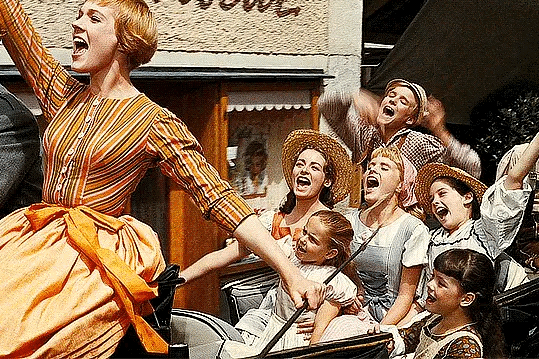
While You Were Sleeping (1995) dir. Jon Turteltaub
Quote: “I've had a really lousy Christmas, you've *just* managed to kill my New Year's, if you come back on Easter- you can burn down my apartment.”

Anastasia (1997) dir. Don Bluth & Gary Goldman
Quote: “There was a time, not very long ago, where we lived in an enchanted world of elegant palaces and grand parties.“

Barbie in the Nutcracker (2001) dir. Owen Hurley
Quote: “There's a world full of wonders out there, Uncle, and Clara deserves to experience them.”
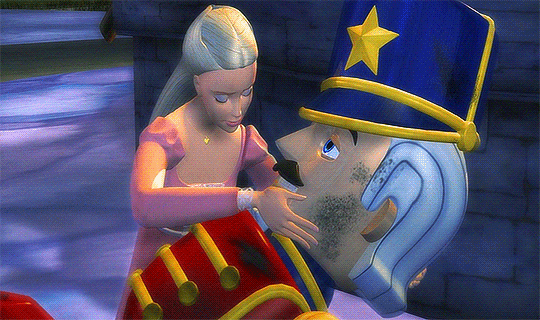
Harry Potter and the Sorcerer’s Stone (2001) dir. Chris Columbus
Quote: “Now if you two don't mind, I'm going to bed before either of you come up with another clever idea to get us killed - or worse, expelled.”

Mean Girls (2004) dir. Mark Waters
Quote: “Raise your hand if you have ever been personally victimized by Regina George.”
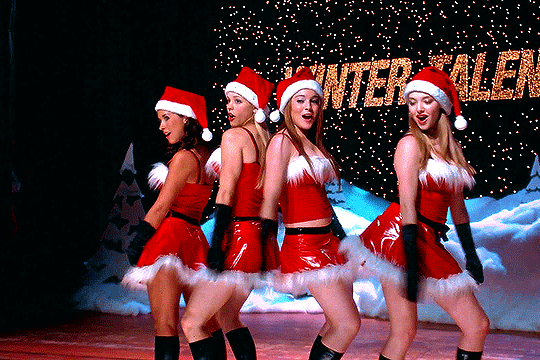
The Chronicles of Narnia: The Lion, The Witch and the Wardrobe (2005) dir. Andrew Adamson
Quote: “Once a king or queen of Narnia, always a king or queen of Narnia. May your wisdom grace us until the stars rain down from the heavens.”
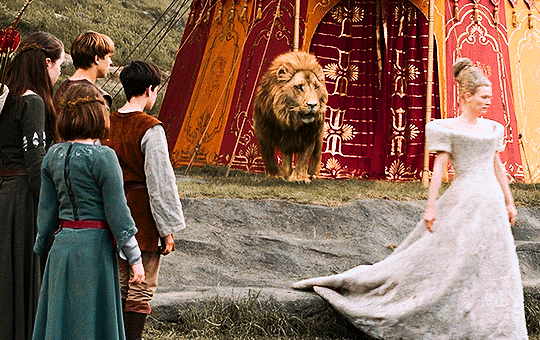
The Twilight Saga: Breaking Dawn Part 2 (2011) dir. Bill Condon
Quote: “My life as a human was over, but I've never felt more alive. I was born to be a vampire.”
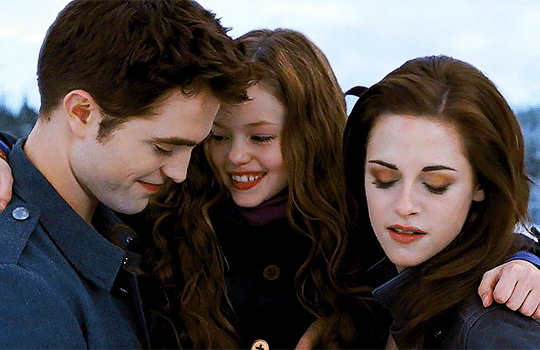
Little Woman (2019) dir. Greta Gerwig
Quote: “Just because my dreams are different than yours, it doesn’t mean they’re unimportant.”
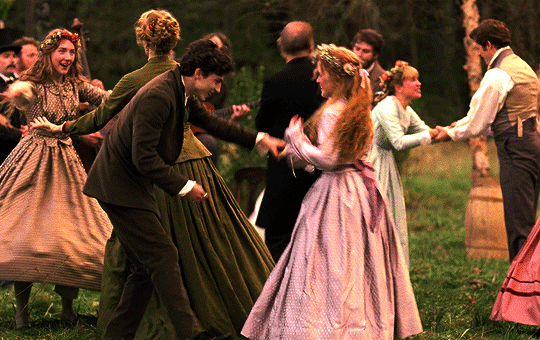
#these are all christmas movies#change my mind (you can’t)#sound of music#while you were sleeping#anastasia#barbie in the nutcracker#harry potter#harry potter and the sorcerer’s stone#mean girls#the chronicles of narnia#the lion the witch and the wardrobe#twilight#twilight saga#breaking dawn#breaking dawn part 2#little women#films#christmas films#holiday films#movie recommendation
52 notes
·
View notes
Text
#BookRecommendation for #WorldOceansDay 🌊:

Fish in Art by Christine E. Jackson (2012)
#animals in art#animal holiday#fish#fishes#fish in art#book recommendation#World Oceans Day#Amazon Associates#natural history art#scientific illustration#art history
38 notes
·
View notes
Text
I went to the Jewish bookstore today. Here are some titles I didn’t buy, but if you’ve read them, I’d like to know whether you recommend them or not.










In Forest Fields: a unique guide to personal prayer
Not in the Heavens: The Tradition of Jewish Secular Thought by David Biale
On the Road with Rabbi Steinsaltz: 25 Years of Pre-Dawn Car Trips, Mind-Blowing Encounters and Inspiring Conversations with a Man of Wisdom by Arthur Kurzweil
Stop Look Listen: Celebrating Shabbos Through a Spiritual Lens by Nehemia Polen
On Being Free by Adin Steinsaltz
My Grandmother’s Candlesticks: Judaism and Feminism, A Multigenerational Memoir by Diane Schulder Abrams
Festivals of Faith: CONNECT and GROW with the JEWISH YEAR by DISCOVERING Is ESSENCE by Rabbi Moshe Wolfson
Why We Tremble
Inside Teshuvah by Miriam Millhauser Castle
Opening the Gates of Teshuva: A Contemporary Commentary on Rabbeinu Yonah’s Shaarei Teshuva by Rabbi Asher Baruch Wegbreit
Knocking on the Gates of Teshuvah: Comments and Insights Rambam Hilchos Teshuvah by Rabbi A. Levin
Life After Teshuvah: Five, Ten, and Twenty Years Later
Vegetarianism, Ecology, and Business Ethics: Three Essays of Judaic Insights into Contemporary Concerns by Daniel Sperber
#I tried asking the woman at the register if she recommends any books she’s read recently#and she said something about being in the middle of 5 books#which very me#but then she didn’t say what books!#instead she started grabbing new arrivals and stacking them in my hands besides never having read them nor knowing if they’re good#like maam#I’ve been around this highlight section for elul and high holidays multiple times and I need one single recommendation#jumblr#jewish books
15 notes
·
View notes
Photo
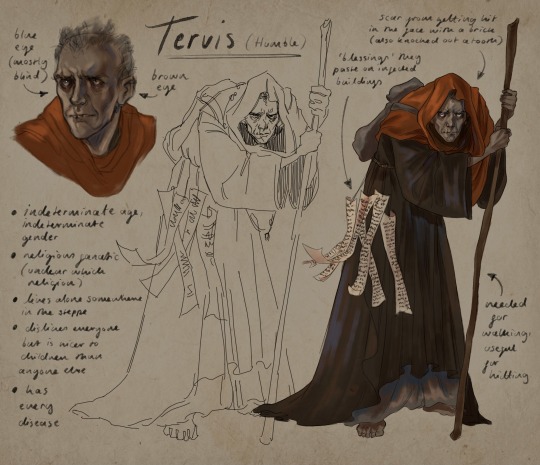



more of my oc tervis (any pronouns), the creepiest most miserable little weirdo in town. which is saying something [id under cut]
/ ID: four digital drawings.
The first image is a series of drawings of Tervis on a paper-textured background. A heading at the top reads 'Tervis (Humble)'. One is a coloured headshot of Tervis looking to the left; they have a gaunt face, short receding hair, a scar bisecting their lip and right eyebrow, greyish skin, and are wearing a red shawl around their neck. An arrow pointing at their right eye reads 'one blue eye (mostly blind)'; another arrow pointing at their left eye reads 'one brown eye'. They have a serious, hostile expression. The second drawing is an uncoloured full-body sketch of Tervis. Next to this is the same drawing but coloured and with more polished lineart. Tervis is a thin, hunched figure wearing a long, dark brown robe, a greyish bag on their back, and a red shawl around their head and neck. They are barefoot, and are leaning on a walking staff with both hands. An arrow pointing to the walking staff reads 'needed for walking, useful for hitting'. Tied to the belt around their waist are several long scrolls of paper with writing on them. An arrow pointing to the scrolls reads ''blessings' they paste on infected houses'. Tervis is looking warily out at the viewer from beneath their eyebrows. An arrow pointing to their head reads 'scar from getting hit in the face with a brick (also knocked out a tooth)'. Alongside these drawings are a series of bullet points giving information about Tervis. These read:
indeterminate age, indeterminate gender
religious fanatic (unclear which religion)
lives alone somewhere in the steppe
dislikes everyone but is nicer to children than anyone else
has every disease
The second image is a fake screenshot from the video game Pathologic. Tervis is looking out at the viewer; the background shows scenery from the steppe. The text on screen reads:
CHANGELING: I still don’t see what you could have done that would make you personally responsible for this plague.
TERVIS: Responsible… no, not merely responsible! This is my plague, cast upon my head alone. I am the originator; my sin is at the root of all. I have ventured into the town. I have seen the canker there. No matter how many houses I bless, my sickness sinks deeper. The rotted limb is the death of the body… Surely you understand me. You are a healer, are you not?
CHANGELING: What is it that you are asking me to do?
TERVIS: Let me be the lamb, worker of miracles! My blood shall wet the earth, and bright flowers shall grow… My putrefaction will provide the soil within which new life will burgeon, pure and free of sin and decay. Let it be done. I am ready. My failing flesh is but little sacrifice; in death my weakness will be my strength. Soon these torments will be at an end.
Below are two dialogue options:
You’re insane!
What makes you so sure your death would solve anything?
The third image is a fake screenshot from the video game Pathologic 2. Tervis is looking out at the viewer, and has been painted in semi-realistic style. The text on screen reads:
Tervis: Why do you force me to live? Damn you! Your cure is poison to me. Now I shall never be blessed. You should have left me to bleed.
Below are three dialogue options:
Don’t be absurd. I wasn’t going to watch you die.
What makes you think you deserve suffering?
I wish I had.
At the bottom of the image is a line of dialogue which Tervis has just spoken:
The air is foul. There is rot in this place. The stench of corruption shall be – what was it? What was it? The stench of corruption shall be… swept aside…
The fourth image is a coloured scene depicting Tervis and Clara. They are central in the composition; around them is the steppe, which has been rendered in a loose, painterly style. Tervis is kneeling, their walking staff cast aside, and are reaching out their hands to Clara in a desperate, pleading gesture. They are crying, their face contorted in an expression of agonised ecstasy. Clara stands beside them, one hand reaching out, the other held above Tervis’s head as though about to touch their brow. She has a solemn, pained expression. Behind her head, a break in the dark clouds gives the impression that she is haloed by sunlight; rays of the same light fall onto Tervis, illuminating their face and red robe. End ID. /
#artwork#pathologic#tervis!!!!!!!!!!!! :-D#sorry i know ive already posted that fake p2 screenshot i just wanted to keep all my tervis images in one place. please forgive me#i am having. So Much Fun. i would explode and die for tervis shes the worst i adore her#making fake screenshots is so enjoyable i love trying to match the fonts and copying all the little ui details it's so fun highly recommend#i have a lot of tervis lore which i am still developing but hopefully these drawings give you some idea of his character#hes just a mess really. hes got every imaginable problem#that last drawing is her getting sacrificed in the humble ending. she is SO happy about it#also if you didnt see my last post tervis was originally a warhammer 40k oc (which he still is ive just made a bonus pathologic tervis now)#but ive tried to keep a lot of 40k stuff in her design like the blessing scrolls and the uh. Posture#that's also my reasoning for why nobody knows what his religion is. the watsonian explanation is they are just spouting incomprehensible#disjointed passages from some obscure scripture which nobody can identify (and who would want to try really. tervis is not good company)#but the doylist explanation is that it's literally just the cult mechanicus. just ignore all the references to the weakness of the flesh and#the glory of the machine it will all be fine nothing weird here at all#anyway :-) i could talk about tervis forever but i will stop now#i hope you are all well my dear friends! i am on holiday now wahoo#i am also aware that i have several messages to answer which i will do very soon i am so sorry for being so slow as usual#i love you all i am giving you individual kisses on your individual heads. mwah
204 notes
·
View notes